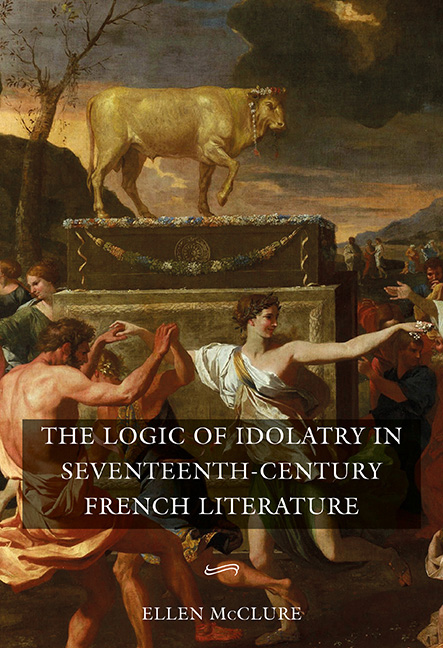Book contents
- Frontmatter
- Contents
- Notes on Translations
- Introduction: The Logic of Idolatry and the Question of Creation
- 1 Idolatry and Instability in Honoré d'Urfé's L'Astrée
- 2 Descartes’ Meditations as a Solution to Idolatry
- 3 Idolatry and the Questioning of Mastery in La Fontaine's Fables
- 4 Idolatry and the Love of the Creature in Sévigné's Letters
- 5 Theatrical Idolatry in Molière and Racine
- Conclusion: The End(s) of Idolatry
- Acknowledgments
- Bibliography
- Index
- Miscellaneous Endmatter
Conclusion: The End(s) of Idolatry
Published online by Cambridge University Press: 28 April 2020
- Frontmatter
- Contents
- Notes on Translations
- Introduction: The Logic of Idolatry and the Question of Creation
- 1 Idolatry and Instability in Honoré d'Urfé's L'Astrée
- 2 Descartes’ Meditations as a Solution to Idolatry
- 3 Idolatry and the Questioning of Mastery in La Fontaine's Fables
- 4 Idolatry and the Love of the Creature in Sévigné's Letters
- 5 Theatrical Idolatry in Molière and Racine
- Conclusion: The End(s) of Idolatry
- Acknowledgments
- Bibliography
- Index
- Miscellaneous Endmatter
Summary
On September 1, 1686, Louis XIV received three ambassadors sent from Phra Narai, the ruler of Siam, in the newly completed Hall of Mirrors at Versailles. This visit was a response to the diplomatic initiative taken by the French monarch, who had sent his own ambassador, the chevalier de Chaumont, to Siam a year earlier, accompanied not only by the colorful abbé de Choisy but by several Jesuit missionaries who had heard that the Siamese ruler was eager to convert to Christianity. Like the French visit to the Siamese court in Ayutthaya, the Siamese visit to France was well documented: in almanacs, in accounts written by the participants, and by Donneau de Visé's protonewspaper, the Mercure Galant, which devoted four special issues to the event.
The French were particularly captivated by the letter carried by the Siamese delegation. This ornate document was written in gold and enclosed in a golden box, which was in turn placed in a silver box that was then placed in a box fashioned from Japanese wood. All of these boxes, the Mercure reports, were in turn covered in gold brocade and sealed with the seal of the first ambassador in white wax. The letter was treated with great care and reverence by the diplomats, since according to Siamese diplomatic protocol, it, not they, carried the representational character, the authority, of the king. Not only did the ambassadors place flowers on the box each day and bow when they approached it, they also needed to be lodged or located below the letter physically. The Mercure notes the alarm of the third ambassador when he is informed that his room in Vincennes is situated above the room of the first ambassador (and thus, above the king's letter). He informs his French hosts that even if they cannot find a suitable room for him, “il aima mieux estre incommodé & mal logé, que de ne pas satisfaire à un respect qu’il regardoit comme un devoir indispensable, & auquel il ne pouvoit manquer sans commettre un crime capital” (he preferred being inconvenienced and badly lodged to not satisfying the respect that he viewed as an indispensable duty which he could not neglect without committing a capital crime).
- Type
- Chapter
- Information
- The Logic of Idolatry in Seventeenth-Century French Literature , pp. 211 - 222Publisher: Boydell & BrewerPrint publication year: 2020

